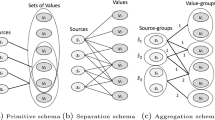Abstract
Shared ontologies describe concepts and relationships to resolve semantic conflicts amongst users accessing multiple autonomous and heterogeneous information sources. We contend that while ontologies are useful in semantic reconciliation, they do not guarantee correct classification of semantic conflicts, nor do they provide the capability to handle evolving semantics or a mechanism to support a dynamic reconciliation process. Their limitations are illustrated through a conceptual analysis of several prominent examples used in heterogeneous database systems and in natural language processing. We view semantic reconciliation as a nonmonotonic query-dependent process that requires flexible interpretation of query context, and as a mechanism to coordinate knowledge elicitation while constructing the query context. We propose a system that is based on these characteristics, namely the SCOPES (Semantic Coordinator Over Parallel Exploration Spaces) system. SCOPES takes advantage of ontologies to constrain exploration of a remote database during the incremental discovery and refinement of the context within which a query can be answered. It uses an Assumption-based Truth Maintenance System (ATMS) to manage the multiple plausible contexts which coexist while the semantic reconciliation process is unfolding, and the Dempster-Shafer (DS) theory of belief to model the likelihood of these plausible contexts.
Similar content being viewed by others
References
C. Batini, M. Lenzerini, and S. Navathe, “A comparative analysis of methodologies for database schema integration,” ACM Computing Surveys, vol. 18,no. 4, 1986.
M.W. Bright, A.R. Hurson, and S. Pakzad, “Automated resolution of semantic heterogeneity in multidatabases,” ACM Transactions on Database Systems, vol. 19,no. 2, pp. 212-253, June 1994.
J. DeKleer, “An assumption-based truth maintenance system,” Artificial Intelligence, vol. 28, pp. 197-224, 1986.
C. Goh, M. Siegel, and S. Madnick, “Context interchange: Overcoming the challenges of large scale interoperable database systems in a dynamic environment,” in Proceedings of the 3rd International Conference on Knowledge Management, Maryland, 1994, pp. 337-346.
T.R. Gruber, “A translation approach to portable ontology specifications,” Knowledge Acquisition, vol. 5,no. 2, pp. 199-220, 1993. http://www-ksl.stanford.edu/kst/what-is-an-ontology.html
J. Kahng and D. McLeod, “Dynamic classificational ontologies: Mediators for sharing in cooperative federated database,” in Proc. 1st IFCIS International Conference on Cooperative Information Systems (CoopIS '96), Brussels, Belgium, June 1996, pp. 26-35.
V. Kashyap and A. Sheth, “Schematic and semantic similarities between database objects: A context-based approach,” VLDB Journal, vol. 5,no. 4, October 1996.
W. Litwin, I. Mark, and N. Roussoupoulos, “Interoperability of multiple autonomous databases,” ACM Computing Surveys, vol. 22,no. 3, 1990.
K. Mahesh and S. Nirenburg, “A situated ontology for practical NLP,” in Proc. Workshop on Basic Ontological Issues in Knowledge Sharing, International Joint Conference on Artificial Intelligence (IJCAI-95), Montreal, Canada, August 1995.
K. Mahesh and S. Nirenburg, “Meaning representation for knowledge sharing in practical machine translation,” in Proc. FLAIRS-96 Track on Information Interchange, Florida AI Research Symposium, May 1996.
E. Mena, V. Kashyap, A. Sheth, and A. Illarramendi, “OBSERVER: An approach for query processing in global information systems based on interoperation across pre-existing ontologies,” in Proceedings of the 1st IFCIS International Conf. on Cooperative Information Systems (CoopIS '96), Brussels, Belgium, June 1996, pp. 14-25.
MIKROKOSMOS: http://crl.nmsu.edu/Research/Projects/mikro/ontology/onto-intro-page.html
S. Milliner, A. Bouguettaya, and M. Papazoglou, “A scalable architecture for autonomous heterogeneous database interactions,” in Proc. the 21st International Conference on Very Large Databases, VLDB '95 Proceedings, Zurich, Switzerland, September 1995.
C. Naiman and A. Ouksel, “A classification of semantic conflicts,” Journal of Organizational Computing, vol. 5,no. 2, pp. 167-193, 1995.
A. Ouksel and I. Ahmed, “Plausible inference of context in heterogeneous information systems,” in Proc. 5th International Workshop on Information Systems and Technology, Amsterdam, December 1995, pp. 120-129.
A. Ouksel and I. Ahmed, “Coordinating knowledge elicitation to support context construction in cooperative information systems,” in Proc. 1st IFCIS International Conference on Cooperative Information Systems (CoopIS '96), Brussels, Belgium, June 1996, pp. 4-13.
A. Ouksel and I. Ahmed, “Using SCOPES for dynamic construction of context in heterogeneous information systems,” in Proc. AIS 1996 Americas Conference on Information Systems, Phoenix, Arizona, August 1996, pp. 623-625.
A. Ouksel and C. Naiman, “Coordinating context building in heterogeneous information systems,” Journal of Intelligent Information Systems, vol. 3, pp. 151-183, 1994.
E. Sciore, M. Siegel, and A. Rosenthal, “Using semantic values to facilitate interoperability among heterogeneous information systems,” ACM Transactions on Database Systems, pp. 254-290, June 1994.
G. Shafer, (1976). A Mathematical Theory of Evidence, Princeton University Press, Princeton N.J.
A. Sheth and J. Larson, “Federated database systems,” ACM Computing Surveys, vol. 22,no. 3, 1990.
M. Siegel and S. Madnick, “A metadata approach to resolving semantic conflicts,” in Proc. 7th International Conference on Very Large Databases, September 1991, pp. 133-145.
G. Wiederhold, “Mediators in the architecture of future information systems,” Computer, vol. 25,no. 3, March 1992.
L. Wittgenstein, Philosophical Investigations, Macmillan Publishing: New York, NY, 1953.
WWW, Refer to: Design Criteria for Ontologies: http://www.dfki.uni-kl.de/~vega/CoMem/Ontology/onto-design-gruber/ subsection3_1_2.html 28 Feb 95
WWW, Refer to: Plan Ontology Construction Group (POCG): KRSL 2.0.2 Ontology Hierarchy: http://isx.com/pub/ARPI/ARPI-pub/krsl/ontology-hierarchy.txt
C. Yu, B. Jia, W. Sun, and S. Dao, “Determining relationships among names in heterogeneous databases,” SIGMOD RECORD, vol. 20,no. 4, pp. 79-80, December 1991.
Author information
Authors and Affiliations
Rights and permissions
About this article
Cite this article
Ouksel, A.M., Ahmed, I. Ontologies are not the Panacea in Data Integration: A Flexible Coordinator to Mediate Context Construction. Distributed and Parallel Databases 7, 7–35 (1999). https://doi.org/10.1023/A:1008626109650
Issue Date:
DOI: https://doi.org/10.1023/A:1008626109650




